
Opus
metrics 2024
Connecting Scholars Through Open Access
Introduction
Opus is an esteemed open-access journal published by the Associação Nacional de Pesquisa e Pós-Graduação em Música in Brazil, focusing on the field of music studies. With an ISSN of 1517-7017, Opus has been dedicated to fostering innovative research since its inception and has embraced the open-access model since 2009, ensuring that its findings are readily accessible to scholars and enthusiasts globally. The journal has achieved a commendable Q2 ranking in Music as of 2023, showcasing its impact and relevance within the arts and humanities. Although currently ranked #130 out of 180 in Scopus in the music category, Opus maintains a commitment to enhancing the scholarly discourse in musicology through empirical studies, theoretical analyses, and interdisciplinary approaches. The journal's convergence over the years, from 2017 to 2024, reflects its dedication to evolving educational and research methodologies in music. Situated in the vibrant academic landscape of Campinas, SP, Brazil, Opus invites researchers, professionals, and students to contribute to its mission of exploring the multifaceted dimensions of music.
Metrics 2024
 0.17
0.17 0.10
0.10 0.10
0.10 4
4Metrics History
Rank 2024
Scopus
JCI (Web Of Science)
Quartile History
Similar Journals
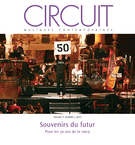
Circuit
Elevating Research in Electrical SystemsCircuit is a prominent academic journal published by PRESSES UNIV MONTREAL, specializing in the field of electrical engineering and circuit design. With its ISSN 1183-1693, the journal serves as a vital platform for disseminating cutting-edge research, innovative methodologies, and breakthrough technologies that shape the future of circuit theory and applications. Despite the absence of an official impact factor, the journal maintains a commitment to rigorous peer review and scholarly excellence, ensuring high-quality content for its readers. Although it operates under a traditional subscription model rather than Open Access, Circuit is essential for researchers, professionals, and students seeking to deepen their knowledge in circuit engineering and related disciplines. Its position within academic literature makes it an invaluable resource for advancing the understanding and development of electrical systems, highlighting the ongoing importance of this field in a technology-driven world.

OR SPECTRUM
Shaping the Future of Operations through Rigorous ScholarshipOR SPECTRUM, published by SPRINGER, is a premier journal in the fields of Business, Management, and Operations Research, with a distinguished reputation established since its inception in 1979. As of 2023, it holds an impressive Q1 ranking in Business, Management and Accounting (miscellaneous) and a Q2 ranking in Management Science and Operations Research. The journal, which is indexed under ISSN 0171-6468 and E-ISSN 1436-6304, boasts a significant impact factor within its scope, making it a pivotal resource for cutting-edge research and theoretical developments. With access options that favor traditional subscriptions, OR SPECTRUM offers a robust platform for the dissemination of innovative ideas and methodologies, vital for academics, professionals, and students alike. The journal's commitment to excellence ensures its critical role in enhancing the understanding and application of operational research techniques around the globe.
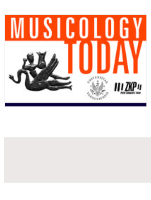
Musicology Today
Unveiling New Dimensions in MusicologyMusicology Today, published by SCIENDO, is a pivotal journal in the field of musicology, presenting a platform for scholars, researchers, and practitioners to disseminate their findings and engage with current trends in music research. With its ISSN 1734-1663 and E-ISSN 2353-5733, the journal aims to provide a comprehensive overview of various aspects of music, including theory, history, and ethnomusicology, fostering a multidisciplinary dialogue among its contributors. Located in Warsaw, Mazovia, Poland, this journal is not only committed to high academic standards but also to promoting open access to knowledge, thereby enhancing accessibility for a global audience. As it continues to bolster its reputation in the academic community, Musicology Today plays an essential role in shaping the future of music scholarship and invites the engagement of seasoned researchers and emerging voices alike.
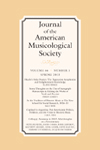
JOURNAL OF THE AMERICAN MUSICOLOGICAL SOCIETY
Advancing musicology through rigorous scholarship.JOURNAL OF THE AMERICAN MUSICOLOGICAL SOCIETY, published by University of California Press, is a prestigious peer-reviewed journal dedicated to advancing the field of musicology. With an ISSN of 0003-0139 and E-ISSN 1547-3848, this journal has been a cornerstone of scholarly communication since its inception in 1970 and continues to be relevant through 2024. Its esteemed standing is reflected in its Q2 ranking in the Music category and a respectable 71/180 ranking in the Arts and Humanities discipline, placing it in the 60th percentile among its peers. The journal provides an essential platform for researchers, professionals, and students to explore diverse topics in musicology, ranging from historical studies to contemporary analyses. While it does not currently offer Open Access options, its rigorous editorial standards ensure the publication of high-quality research that contributes significantly to the academic dialogue in music studies. With its address based in the United States at 155 Grand Ave, Suite 400, Oakland, CA 94612-3758, the journal remains a vital resource for those seeking to deepen their understanding of the complexities of music and its societal impacts.

Studia Universitatis Babes-Bolyai Musica
Unlocking Musical Insights for a Global AudienceStudia Universitatis Babes-Bolyai Musica is a prestigious academic journal dedicated to the field of musicology, published by UNIV BABES-BOLYAI. Since its inception, it has strived to foster scholarly communication and share groundbreaking research that spans various music-related disciplines, including ethnomusicology, music theory, and performance studies. The journal operates under an Open Access model since 2021, ensuring that its content is freely accessible to a global audience of researchers, professionals, and students interested in advancing their knowledge and understanding of music. By providing a platform for high-quality, peer-reviewed articles, Studia Universitatis Babes-Bolyai Musica plays a vital role in promoting significant contributions to the evolving discourse in music studies. Its commitment to intellectual rigor and openness aligns with contemporary academic trends, making it an essential resource in the realm of music research.
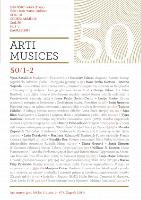
Arti Musices
Pioneering New Ideas in the Study of Music and CultureArti Musices is a distinguished open-access journal published by the Croatian Musicological Society since 2007, dedicated to advancing the field of musicology and related arts and humanities disciplines. Operating from Zagreb, Croatia, this journal aims to provide a platform for scholarly communication, fostering international dialogue among researchers, musicologists, and practitioners. Although it has a current Scopus ranking in the bottom quartile within its category (Q4 in Music), it offers a unique perspective on the musicological landscape, particularly from a regional standpoint. Researchers seeking to contribute to or glean insights from this evolving field will find that Arti Musices serves an important role in disseminating innovative ideas and empirical research. The journal accepts submissions across a broad spectrum of music-related topics, inviting contributions that reflect the complexities and cultural contexts of music today.
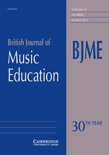
British Journal of Music Education
Connecting Research and Practice in Music EducationBritish Journal of Music Education is a prestigious academic publication dedicated to advancing the field of music education. Published by Cambridge University Press, it benefits from a notable impact factor that positions it in the Q2 category in Education and the Q1 category in Music as of 2023. This journal serves as a vital platform for researchers, educators, and students alike, focusing on innovative research, pedagogical studies, and theoretical discussions that shape the practice of music education globally. Since its inception in 1984, the journal has contributed significantly to the understanding of music pedagogy and continues to be relevant and influential, currently spanning the years from 1984 to 1998 and 2007 to 2024. With impressive rankings, including rank #16/180 in Arts and Humanities (Music) and rank #669/1543 in Social Sciences (Education) on Scopus, it highlights the journal's commitment to scholarly excellence. Though it does not currently offer open access, its contributions are an essential resource for anyone involved in the education landscape of music.

Problemy Muzykalnoi Nauki-Music Scholarship
Connecting Scholars Through the Art of MusicWelcome to Problemy Muzykalnoi Nauki-Music Scholarship, a leading journal in the field of music scholarship published by the esteemed Gnesin Russian Academy of Music. With an ISSN of 2782-358X and an E-ISSN of 2782-3598, this Open Access journal has been committed to the dissemination of high-quality research since 2009, making scholarly work accessible to a global audience. Covering diverse aspects of music theory, history, and its socio-cultural impacts, Problemy Muzykalnoi Nauki serves as an essential platform for scholars, educators, and practitioners in the arts and humanities, as well as in social sciences related to music education. While its Scopus coverage was discontinued in 2021, the journal remains influential, holding a rank of #48 in the Arts and Humanities category and a percentile of 67th, showcasing its relevance and rigor in the discipline. We invite researchers and students alike to explore the rich contributions made within these pages, fostering a deeper understanding and appreciation of music in contemporary society.

Revista de Musicologia
Diving into the Rich Tapestry of MusicologyRevista de Musicologia is a distinguished academic journal dedicated to the exploration and analysis of musicology, published by the SOC ESPANOLA MUSICOLOGIA. Based in Spain, this journal serves as a vital platform for music scholars, researchers, and enthusiasts to share innovative insights and original research concerning various aspects of music, including historical studies, ethnomusicology, and contemporary critiques. With its ISSN 0210-1459 and a current Scopus ranking placing it in the Q3 quartile of Music studies, the journal reflects a commitment to enhancing the discourse in this rich field. Although it currently does not publish under an open-access model, it continuously aims to provide a rigorous peer-reviewed environment for contributions that engage both academic inquiry and practical applications within musicology. The Revista de Musicologia is thus an essential resource for anyone in the field looking to expand their understanding and expertise in music studies from 2016 through 2024 and beyond.
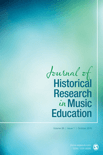
Journal of Historical Research in Music Education
Exploring Historical Narratives in Music EducationThe Journal of Historical Research in Music Education, published by SAGE Publications Inc, stands as a vital resource dedicated to advancing the understanding of the intersection between music education and historical scholarship. With ISSN 1536-6006 and E-ISSN 2328-2525, this journal serves as a beacon for researchers, educators, and students interested in exploring the influences and developments in music education from a historical perspective. Although classified in the Q4 quartile across the fields of Education, History, and Music, and while it ranks lower in the Scopus rankings (e.g., #969 in History), the journal remains committed to shedding light on significant yet often overlooked historical contexts in music education. The journal's scope from 2015 to 2024 emphasizes contemporary interests and challenges faced in the field, encouraging the dissemination of innovative research. As an essential repository of knowledge, the journal invites submissions that critically engage with historical perspectives, ensuring that the narratives of music education continue to resonate within and beyond academic circles.